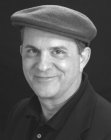

What makes someone become deeply involved with playing, writing and recording pop music?
That's a good question. There are a million stories to be told as to why and how this happens.
This is my story.
My interest in music began at an early age. Born in Atlanta, Georgia, I grew up in Gainesville, a university town in northcentral Florida where I lived from 1958 until 1976. My parents were originally Canadian, and their parents' ancestries were European: Lithuania, Hungary, Poland, making me a second-generation "melting pot" American. I would love to know what songs my grandparents listened to when they were young.
The particular region of Florida where I grew up has always been a musically rich and fertile part of the U.S. I was surrounded by music in her varied and wondrous forms: bluegrass, gospel, soul, rock n' roll, folk, blues, whatever and whoever appeared at the University of Florida.
Several major pop stars (Tom Petty; Don Felder and Bernie Leadon of the Eagles), two members of one "new wave" band (The Motels) and a band called Sister Hazel (currently the biggest act from Gainesville) hail from Gatortown. There was plenty, and I mean plenty of great live music in Gainesville. An early memory was seeing Peter, Paul and Mary perform at the University Auditorium, maybe around 1962.
Later shows at the University included Ravi Shankar, Donovan, Janis Joplin, Paul Winter Consort, Pacific Gas and Electric, Sugarloaf ("Greeneyed Lady"), the Fifth Dimension, the Supremes, Rotary Connection, Todd Rundgren, the Allman Brothers, and the Super Show at Florida Field: The Beach Boys, Buffalo Springfield, and the Strawberry Alarm Clock! Music performances were in the air as much as the barely-tolerable humidity and prehistoric-sized insects that surrounded us.
Several times dad packed us all up in the family Studebaker station wagon to attend the annual White Springs Folk Festival north of Gainesville, way down upon the Suwanee River, to hear a vast variety of folk music, the real thing.
Gainesville was a mid-size town ("Population 49,722," on the city limits sign driving into town). After living in the central part of the city the first five years, in 1963 we moved to the south part just outside the city limits, off US-441 in a house on Biven's Arm, a wildlife preserve lake teeming with ducks, herons, catfish, anhingas, water moccasins and many alligators. Large, healthy, well-fed alligators. Ten-foot long alligators.
One thing made all the difference. Gainesville is the home of the University of Florida, where I spent my formative teenage years honing my very slowly-burgeoning musical skills. Never underestimate the powerful effect of music-based activities---part of every college town---upon a small, bored boy.
That boy was me.
I became hooked on music from the beginning. How could I not? It was fun. My parents played music, so I heard live music at an early age, there was a piano in the house, AM radio was the big thing, and for many other reasons soon to be revealed.
Warning: The narrative may at times suddenly slow down and delve into excruciating detail regarding seemingly trivial incidents. I am aware of this, and even now I anticipate your callous, brazen demand: "Hey Marty! Pick up the pace! Enough detail! Give us a road story, a drummer joke!" Let me assure the reader that there is no such thing as a trivial event in a person's life! Everything contains deep, multi-layered meaning!
Furthermore, these vivid "you-are-there" touches will allow you to "see" the dim, smoke-filled Florida topless bars, stagger through the after-hours bottle clubs, hear the inspiring musical highs (and hideous, crashing musical lows) of early and yes, even later gigs, to relive the aromas of these venues (especially those of the topless club): in primus, to experience, as nearly as possible on the Internet, the musical journey of one musician.
Mom played piano quite well and would perform boogie woogie, classical, children's songs, folk songs -- almost anything. I remember pounding on our Wurlitzer spinet piano as early as 1960 or so. Dad was a psychology professor at the University of Florida. At home he played harmonica (Yiddish, folk and cowboy songs) as well as acoustic guitar -- flamenco, classical, cowboy songs, Yiddish songs, etc.
My parents' musical tastes were wide and eclectic --Harry Belafonte, Alan Sherman, Theodore Bikel, The Kingston Trio, a lot of Negro music, Leadbelly I especially remember, and ten-inch LP records of Josh White, Burl Ives and Brownie McGhee and Sonny Terry. A primal memory was the cover image of an album by Lynn Hope, a black tenor sax player who wore a turban. This mystified and fascinated me. We also had a 2- LP Columbia sampler with a huge variety of artists that was like an encyclopedia of music for me in these early formative years. Bix Beiderbecke's "Jazz Me Blues," "Moon River" by Jerry Murad and his Harmonicats, and Dave Brubeck's "Take Five" were three early memories.
I remember also the radio songs, my first firm memory of a pop song is probably "Return To Sender" by Elvis Presley when it first played on the radio in the Fall of 1962...I was eight years old. I thought he was singing about a girl Cinda and the chorus was "return to Cinda." I also equate "Telstar" the instrumental with the whole fallout shelter/space race period in American pop history.
The first single I bought (in 1963) was "Walk Like A Man" by the Four Seasons. My older brother Jeff bought "Memphis" by Lonnie Mack that same day, we payed 49 cents each for the records, at G.C. Murphy's, a local department store five and dime.
We had one of those Motorola hi fi players, a brown wood cabinet with a flip top, speaker cloth interspersed with gold threads, and an AM-FM radio/record changer inside, on four inch wood legs.These record players sounded warm and they were loud!
Other songs I remember from this period were Leslie Gore's "It's My Party," "Judy's Turn To Cry", both of which were produced by Quincy Jones, songs by the Bobbys: Bobby Vee, Bobby Rydell, Bobby Vinton, and of course "Itsy Bitsy Teeny Weeny Yellow Polka Dot Bikini," "Short Shorts," "Monster Mash," "Papa-Om-Mow-Mow," "Who Put The Bomp?" and many more, including what must have been a local hit, "Please Don't Talk to the Lifeguard" (with the stirring refrain "Guess I'll swim way out into the sea, and talk to him when he comes to rescue me...").
When I was in fourth grade we moved to England for a year, from Summer 1964 to Fall 1965. Dad was on a sabbatical from the University of Florida, and he chose to study in London with R.D. Laing , a noted psychiatrist. That year we lived in a small semi-detached house in Southgate, at 6 Summit Way, Southgate London N14.
The Beatles and the Stones were both gaining popularity and were on TV every two or three weeks, on either "Ready, Steady, Go!" or "Top of the Pops," two shows we watched religiously, on a black and white set with a switch on the back for BBC2, a sharper broadcast format with 680 lines per inch. English TV had more lines than American and they didn't have commercials on BBC1 and BBC2.
I loved watching the studio band on RSG and seeing the first TV appearances for The Animals, The Hollies, The Beatles, the Rolling Stones, Them (with Van Morrison) and the Dave Clark 5, The Honeycombs. Music, British Rock and Pop, was the worldwide craze, and we were in London soaking it up at the source. I remember seeing "Help!" in a theatre crowded with screaming fans.
I (and my younger brother Leonard) attended Osidge Elementary School, while Jeff went to Ashmole Secondary Modern School. We would compare experiences, which at first were uniformly bad (they didn't like "bleedin' Yanks") and Jeff especially mentioned the antics of this fellow 13-year-old kid named Mitchell Winehouse. He was always getting in trouble with the teachers and seemed to thrive on attention, a real cut-up. As it turned out, the kid grew up, had a daughter named Amy, and as they say, the rest is history.
The first live band I ever saw performed at the Saturday matinee in the Odeon Theatre near our house. The cartoons and feature were over, kids had stopped throwing their candy at other children (I was once hit in the back of the neck by an unopened Slo-Poke, an unforgettable experience) and the band, "The Pioneers" were late. The MC came out: "Okay, they'll be out soon, so give them a warm welcome: We want the Pioneers!" We did for ten minutes, and they came out and weren't very good. But I thought, "That looks like fun."
Music was part of the every day scene in England. The radio, movies and television were all crackling with the cultural dynamite of the New Sound! My older brother, Jeff, whom I worshiped, became fixated by rock music, him being 14 and able to absorb even more information than I.
When we returned to Florida the fall of 1965, big bro' Jeff was ready for ninth grade with Beatle boots and long hair. It occurred to me that my older brother was cool and played music. Therefore, using simple deductive logic, I figured that if I learned how to play music I too would be cool. At least, that was the theory.
Jeff soon got a electric guitar, an amp and began learning songs from records: Jimmy Reed, Howlin' Wolf, every Rolling Stones album the day they came out, jazz guitarist Howard Roberts, and whatever was out and happening at the time: The Hollies, The Animals, Moby Grape, Frank Zappa and the Mothers of Invention (his 1966 debut album "Freak Out" definitely freaked me out), The Beatles.
This was the Golden Age of Rock! The variety of sounds, the mystique of the hippie culture long hair, music, free music on the Plaza of the Americas ---these formed a seamless backdrop to my lonely teenage years.
Yes. Lonely teenage years. I was a skinny, highly verbal, intellectually precocious, endlessly self-involved, horny kid with bad skin, glasses and braces, a veritable anti-Casanova of the late '60s.Women shunned me in droves.
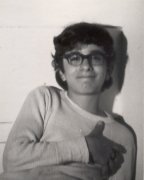
Here I am girls, line up...
Always ready with a quick quip or joke, I was hilarious and "sweet." No adolescent boy ever wants to be called "sweet" by a girl. Sweet = unattractive in a sort of pathetic and harmless way. I wanted nothing less than to have girls fall in love with me as I played The Powerful Rock Music. The problem was, how can I get in a band?
Around 1969-70 I became acquainted with two fellow high-school students while I was in ninth grade: Gary Gordon, later to become the mayor of Gainesville, Florida for a few years, and Steve Soar, who was a gifted electric guitarist and later went on to become an engineer at Tektronix in Vancouver, Washington. These two talented (and one year older) fellows had a band that actually played gigs. The name of their band, and soon to be the name of my first band, was the Airmont Classic, named after a line of classic books in paperback form. I played harmonica with them at a Westwood Rec Center dance and I remember the thrill of performing with a full band. It was great! The bass player was a fellow by the name of Glen Anton. I would sit in on bass and Glenn noticed that I picked up ideas quicker than him, and he became slightly jealous. He quit soon after, and as I had determined that bass players were rare and the bass had only four strings, making it seem like an easy instrument to play, I offered my services as their new bassist.
They said O.K. I was in The Airmont Classic.
Eventually I learned to play at least acceptable rudimentary bass guitar, and our career lumbered forward. I later, jokingly (I swear!) suggested naming the band "Uncle Funnel," at least as good a name as Airmont Classic. Oddly, the band was renamed thus and we carried on the bold tradition of Florida Rock in 1970 as Uncle Funnel.
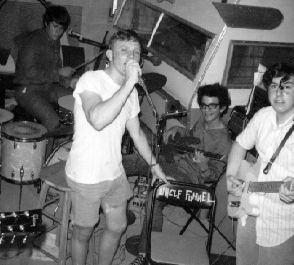
Above is an unbelievably rare promotional poster of Uncle Funnel and The Push (that's right, folks), courtesy of Gary Gordon, showing my new, streamlined look, a Sears Neatnik blue tapered shirt and my best Sears jeans.
I'm also that handsome devil sitting on the chair in the previous photo, with Clark Kent glasses and a really "special" Afro hairdo.
We were quite an act, featuring the vocal stylings of Joe Folsom (a/k/a JoJo Kincaid), who later on became a radio DJ with a big FM station on the East Coast, where I bumped into him ten years later in Boston while touring with The Motels. Currently he is the morning drive DJ for Q 106 San Diego. Here's JoJo, thirty-eight years later:
Then there was the white satin shirt with contrasting sash of Gary Gordon, a rocking teen who played a powerful rhythm guitar style and had a great purple Nehru-collar puff-sleeve stage shirt. . Recalling Gordon's performance of Jimi Hendrix's "Fire" still gives me a chill, his white Fender Telecaster gleaming in the shifting lights of our home made light show: colored outdoor floodlights attached to poles, triggered by toggle light switches mounted on a plywood frame. Minds were blown.
We often played at one of the University of Florida's most venerable and cherished gigs, the Alpha Gamma Ro (AGR, or Agricultural) fraternity dances held on many a Friday. The front lawn of the AGR house featured the emblem of their fraternity, appropriately, a large plow on a concrete base. There would come a time in the evening show when, as if by some invisible higher power, the dancers would all stop and someone would demand "Play 'Wildwood Flower!' " Steve Soar would begin playing a faultless rendition of the old country song and the dancers would shuck and jive out the door, form a circle around the plow, whoopin' and screaming while we played to an empty dance floor. Those were the days. All this, plus a few guest vocal shots (I sang "Sookie Sookie" by Steppenwolf as my first live vocal performance) and $150 to split between me, Joe Folsom, the singer, Gary Gordon and Steve Soar, guitars, Tommy Freeland, drummer! Freeland's big moment was playing his version of Cream's drum solo song, "Toad."
These were unforgettable poignant moments in the history of Rock. I would wear my best jeans and a blue cowboy style shirt with white snaps instead of buttons, specially tapered and bought at Sears, offset by my gleaming braces; a Kent bass, and a Fender Bassman amp with a TB1 cabinet with two 15" SRO speakers in it, hideous brown speaker cloth. I wasn't exactly Sting or Paul McCartney on the bass (there was no Sting back in 1970) but I did all right. At some point in the narrative I took bass lessons from a musician named Don Felder, who later moved to California and joined the Eagles. Here is a recently discovered photo I took of Don when he worked at Marvin Kay's Music Center, a small music store on University Ave. I used to hang out there at age 14, greasing up the Gretsch Country Gentleman electric guitar (you can see it hanging on the wall, to the right of the Mosrite electric, just behind Felder's ear)and playing the other instruments. Bands like the Night Crawlers, the Jades, the Certain Amount, and Styrophoam Soule would come in during the weekend and hang out.
Don Felder, before the Eagles and "Hotel California"
Each half-hour lesson cost three dollars and I gamely played arpeggiated scales as Felder patiently showed me where the notes were on the neck. I switched to taking lessons from the owner of the music school: Paul Hillis, whose Hillis School Of Music was a second floor space next to an old style newstand with a shoeshine stand that sold newspapers, magazines, cigars, "adult" reading material in the back section, Coca Colas-- a place straight out of the 'Thirties.
I played, while taking a lesson, on the studio-provided gear: a white Kalamazoo bass and an Ampeg flip-top model amp with the big speaker. This setup sounded and played much better than my little amp at home and my truly shitty Kent bass.
Paul Hillis was the classic Mr. Jazz dude, he played piano at lounges, put together jazz trios and various lineups for the varying musical needs of Gainesville's Society set. He was a good teacher, he showed me some basic bass concepts, like playing near the root and playing on time. I'm glad I took lessons but I didn't enjoy them for some reason. I preferred listening to records and copying the parts on the bass. My ability to extract parts by ear has bailed me out of many a musical corner.
This playing the bass in ninth and tenth grade is Ground Zero for my professional career, I would stay in my room overlooking the gator-and-snake infested lake we lived on just outside the Gainesville, Florida city limits, playing along with the record player on the bass, plugged into Jeffs tiny Gibson Explorer amp with the 10" speaker and open back. I was not setting the world afire with that rig or my riffs, believe me. But from such insignificant beginnings rise every musician, gators notwithstanding.
At some point in this part of my life, I hooked up with a guy called Stan Lynch and some other players and we came up with a one-shot band called Flash and the Cosmic Blades . Little did the guests at our one performance know, but two members of this ridiculous band would be in the Motels and Tom Petty and the Heartbreakers. But then again, neither did we. All I remember about this band was that it was basically a joke, and that we did a jazz version of "Wipeout" with me playing the melody on flute, and another song called "Spaceman Blues," an early original featuring me on really crude alto sax with the reverb cranked way up to simulate Outer Space:

Later, Chuck Newcomb, a very good bass player, gave me a Lafayette bass, from the Lafayette Radio and Electronics catalog Jeff and I read dutifully, along with its competitor, Allied (later Radio Shack) Electronics. Somehow, I later purchased a Fender Telecaster bass, a big, chunky, natural wood finish log of a bass, with a banana neck (bowed), Rotosound Roundwound strings. This massive object became very heavy on the shoulder after a few sets of songs by Hendrix, The Rascals, Creedence Clearwater, The Beatles, Steppenwolf, and even bubble gum favorites like "Gimme Gimme Good Lovin."
I started singing more, Joe the singer quit, and now I was learning the words to all the songs Joe sang. Playing bass and singing wasn't as natural as you think, and it took a while to figure out how to do both at the same time. It can be a very syncopated experience at times.
The summer of 1972 found me in a three-piece power trio called Road Turkey.
![[Steve Soar, Marty Jourard, Stan Lynch around 1971]](3turkey.jpg)
Steve Soar, Marty Jourard, Stan Lynch
Myself on bass and vocals, Stan Lynch, a 15- year -old powerhouse drummer (even back then Lynch had major chops), and Steve Soar, an unusually fine guitarist. Together we played early rock 'n' roll hits like "Ready Teddy" and "Tutti Frutti," and I would sing Grand Funk songs. The Doors, Allman Brothers ( challenging as a three piece), and many more. We became friends with the band Mudcrutch, featuring a very long-haired Tom Petty and an already-great Mike Campbell and various other rockers. We played local clubs (really just beer bars with a tiny stage at one end) such as Mad Monk's Inn, The Keg, The Rathskeller, and Dub's Steer Room. But first, Trader Tom's.
Tom Henderson was unique. He was basically a real Southern down home fellow, but he understood the psychology of running a roadside club in the deep South with topless dancers, live music (Road Turkey) on Wednesday, Friday and Saturday nights. The converted one room store offered topless table dancing for $1 a dance ("Keep the songs short" we were told by dancers and Tom alike), $3 pitchers of tepid, watered down Old Milwaukee beer. Tom insisted that at the moment he opened the doors, promptly at 9pm, the lights were flashing, the band was ready, and "Fire and Water" by Wilson Pickett was playing on the jukebox. Pickup trucks filled the parking lot, and business was brisk on Friday and Saturday night. His wife Lill, a sweet, patient and sharp woman, had a quarter with an X painted on both sides in red fingernail polish to start the night, marked for later retrieval from the jukebox operator.
EARLY UNION BULLETIN: Tom asked us once to find out which of our songs were BMI published. BMI was asking for licensing of music and Tom didn't want to pay. Playing only non-BMI published songs would have decimated our 42 songs to just four or five. We told Tom we got rid of all of them (we didn't). He was satisfied, as was BMI; we never heard anything about it again.
Dance contest was Wednesday. the dancers would each get one song, and they would ask us to play their favorites. The band would be playing, the crowd lusting in response to every hip twitch and pelvic thrust, as each dance contestant would be thinking of the prize money. All this and getting paid too! Living at home, no bills, family car, and dad's Shell credit card. Gas was 33.9/gallon back then anyway, and a Krystal Burger (Take Home a Sack) was 12 cents.
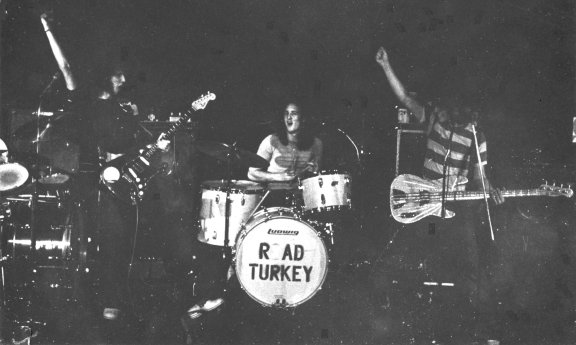
Road Turkey circa 1972 at the Rathskeller, a University of Florida bar.
You can sense the
excitement as Steve and I demonstrate early synchronized choreography and Stan Lynch,
temporarily stunned, stops playing drums and looks on in awe. Note the silver tape I stuck
all over my Telecaster bass. We were probably playing the MC5's "Tonight," a crowd fave.This early fantasy version of what rock and roll life was all about hooked me on the allure and so called glamour of the biz. As far as I could see there was no downside. Playing music, going to school, "meeting" girls, driving to the beach, late parties at various apartment complexes. The winner of the dance contest earned $50 or $100 and the competition was fierce between a couple of them. That extra money was worth a serious try at getting everyone in the room hot. This one girl had a heart patch on the front of her panties, causing it to be the center of attention. When she danced, every eye of every southern male in the place was glued to, her, uh, main attraction. I got to know three of these topless dancers, and even thought I was going steady with one for a few weeks. Ah, Anita B. where are you now? Music, romance, sex, gainful employment; all the elements of a blockbuster movie script are in here!
Back then, playing Trader's three nights a week at $50/night for the band, was a cool $50 each per week. Furthermore, a young social misfit was suddenly taking a crack, so to speak, at some hot after-hours topless dancer action. Music had hooked herself another victim.
These were exciting times for the still-innocent author. These women looked especially good in bar lighting. A chance encounter in the cold light of day often proved heartbreaking.
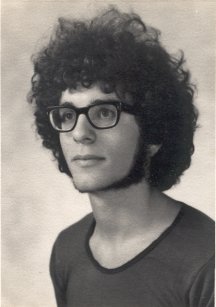
I was almost 18 years old and in desperate need of fashion advice...
So I graduated high school (along with my hair and Clark Kent glasses), and I had enrolled in Clark University, in Worcester, Massachusetts, a dreary industrial town an hour west of Boston, a city I loved. On a 1972 winter trip to see Clark, Brandeis and Amherst I flew up to Boston and stayed at Mike Hitchcock's girlfriend's sofa, a hot babe who was never there.
I found out how to eat for free. I hung around the busy deli downstairs from the apartment. When somebody left their table, it took the busboy about two minutes to come around and remove the dishes. Before me were entire halves of sandwiches, untouched; pickles, potato chip garnishes, rolls. I gorged myself in about ten minutes, came back the next day and did the same. One day I saw Steven Tyler walking down the street, someone this junkie girlfriend knew. He said his band Aerosmith had just signed to Columbia and they were busy working on their first album. Even back then, he looked exactly like...Steven Tyler.
At Clark I took music theory and started jamming with a Jeff Beck look-alike, Mike Duke, from Boston. He had the rock look down, he smoked, had a Beck haircut, played a Les Paul passably, and had some suspicious musical friends, two of whom were junkies. Jack M, who had an SVT amp setup and a Les Paul Jr. and sounded like Leslie West. Mike S., a good drummer but alas; a junkie as well. Mike S. played solid drums, and he had a friend who worked at a hospital who supplied him and Jack with clean syringes and needles.
I must have been crazy, but we would rehearse in my dorm room at night. Drums, bass guitar, guitar. Crazy! The other guys trying to study would flip the circuit breaker every time. I'd reset it, they'd trip it. After three trips, I concurred. Then Mike S. and Jack would fight. Then they announced to me that "we shouldn't fight when we're shooting heroin."
It was at that precise moment I realized I was dealing with a much heavier scene than that shared by my friends in Florida's beer-babes-and-the-beach set. I played bass for "Bye-Bye Birdie" and I learned a little about charts but mostly faked it. Bass clef was difficult after learning the alto clef on sax and piano. I heard great music on my frequent trips to Boston by bus on Route 9, with the bus driver calling out our destinations in sing-song fashion: "Shopper's World, Framingham, Roxbury and Boston."
During 1972-73 while attending Clark and visiting Boston clubs during the weekend I saw great jazz. At Pall's Mall ($6 cover, two drink minimum): Chick Corea's Return to Forever with Flora Purim and Airto Moriera on drums; Larry Coryell. I saw the MC5, Bob Seger and Mitch Ryder and Detroit at the Aquarius Theatre. I saw Traffic, Stevie Wonder, BB King, Jeremy and the Children, and at Clark I saw Poco, Tom Rush, Full Moon (with Buzz Feiten and Neil Larsen) and many forgotten pop groups working the 1973 east Coast college circuit. Stevie Wonder played in Worcester, he was just amazing. Plenty of schools, plenty of entertainment budget, and I even caught some jazz in Worcester once. But Worcester was scary: tough working class kids ("townies") with unemployed fathers, retired factory workers walking the streets, bars with 25-cent beer. I never spent time there. I would walk about a half mile to the bus stop to go to Boston.
Boston was a magic place for me and I'll remember the edginess of seeing snow and city streets; a far cry from Gainesville, Florida! Glitter and glam rock, David Bowie, Rorer 714s for 20 cents each. At Clark, Leo Kottke played in the Commons one night, I missed it but a kid was playing back the show on a Revox tape recorder and it sounded amazing. Sorry I missed Leo but I saw him in 1995 at the Backstage.
I played with a band that wanted me to stay because they needed a singing bass player. But I was weary of the East coast style and the women's lib brashness and downright ugliness of the East Coast women. The accents and cold weather were too much for this Southern Boy, and I yearned for home. I came back by train, and was greeted at the Waldo, Florida Amtrak depot, first with a wall of hot humid Florida air as I left the air-conditioned train, and soon after by my grinning 17-year-old brother Leonard in the family Buick Sportwagon. I was home.
Well, that was quite a story. Is there more? Hey--could Duane Allman play guitar?